Tollefe 78W 5-in-1: Best Overall
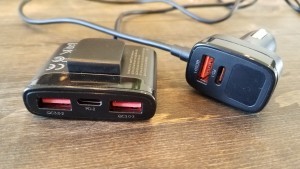 Tollefe 78W 5-in-1 Car Charger
Tollefe 78W 5-in-1 Car Charger
71
OVERALL SCORE
- Power Output & Charge Time 8.0
- Ports 7.0
- Features 7.0
- Size 5.0
REASONS TO BUY
- Five ports for multiple devices
- Supports quick-charging technologies
- Integrated voltmeter
REASONS TO AVOID
- May not optimally support five simultaneous high-power devices
- The extension cord can be somewhat cluttered
SPECIFICATIONS
| Quick Charge Compatible? | Yes |
|---|---|
| Number of Ports | 5 |
| Types of Ports | QC, PD |
| Cord Included? | Yes |
| Total Wattage | 78 |
The Tollefe 78W 5-in-1 stands out as a highly versatile and capable car charger, earning its place as our top overall pick. Our primary tester highlighted its strength in bringing smart charging capabilities to the rear seats of vehicles, making it an ideal choice for families or anyone needing to power devices in the back. The port arrangement is well-considered, featuring two QC 3.0 and one PD 3 port on the extension end, alongside another QC 3.0 and PD 3 port conveniently located at the 12V adapter plug. A particularly useful addition is the integrated voltmeter with a clear LED display, showing your car’s battery voltage. As our tester noted, “While perhaps less critical in newer vehicles, observing the voltage is beneficial, especially with older vehicles using unregulated 12V lead-acid batteries.” Monitoring voltage can be key to understanding your vehicle’s electrical health and charging efficiency.
While the 6-foot extension cable of the Tollefe 5-in-1 offers great flexibility, it can introduce some cable management challenges. It’s also important to note that while it boasts five smart charging ports, optimal performance is best achieved when charging up to three devices simultaneously. Pushing to five devices can lead to a noticeable decrease in charging speed across all ports. For users consistently needing maximum power output across multiple devices at once, the AI AIKENUO Multiport QC 3.0 might be a stronger contender. However, as our tester summarized, “The Tollefe is an excellent all-around car charger, especially well-suited for modern families with older or classic vehicles who need to add charging options in the rear.“
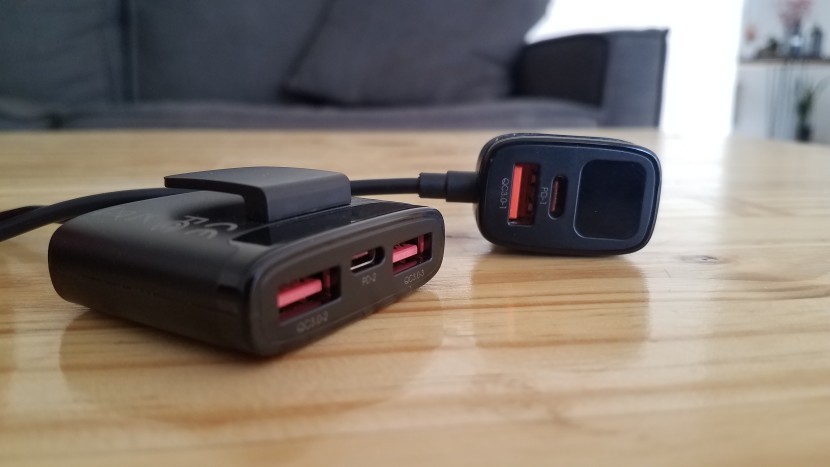 Tollefe 78W 5-in-1 Car Charger in Use
Tollefe 78W 5-in-1 Car Charger in Use
The Tollefe 78W 5-in-1 car charger effectively brings smart charging ports to the back seats, ideal for older or classic cars.
Credit: Benjamin Hickok
Spigen SteadiBoost: Best Value Car Charger
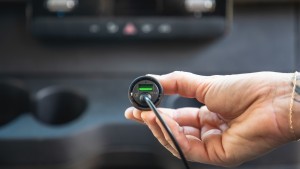 Spigen SteadiBoost Car Charger
Spigen SteadiBoost Car Charger
70
OVERALL SCORE
- Power Output & Charge Time 9.0
- Ports 7.0
- Features 4.0
- Size 7.0
REASONS TO BUY
- Supports both PD and QC fast charging
- Compact design
- Very affordable
REASONS TO AVOID
- Dim power indicator light
SPECIFICATIONS
| Quick Charge Compatible? | Yes |
|---|---|
| Number of Ports | 2 |
| Types of Ports | QC, PD |
| Cord Included? | No |
| Total Wattage | 45 |
The Spigen SteadiBoost emerges as the best value car charger, delivering exceptional performance and essential fast-charging technologies at a remarkably accessible price. This standard format charger is equipped with both PD 3.0 and QC 3.0 compatibility, ensuring rapid charging for a wide array of devices. Our tester was particularly impressed, stating it “offers exceptional value for a dual-port car charger.“
Finding significant drawbacks to the SteadiBoost proved challenging. “If we were to nitpick,” our tester commented, “we would prefer a brighter power indicator light, or perhaps backlighting for the USB ports themselves.” However, these are minor points given the overall package. The Spigen SteadiBoost provides both QC 3.0 and PD 3.0 fast charging capabilities for under $20, a value proposition that’s hard to beat. For those seeking even greater savings and a slightly smaller form factor, the Hussell 3.0 is another budget-friendly option. While it scored slightly lower overall and lacks a USB-C port, it still represents a solid budget choice in the realm of car chargers.
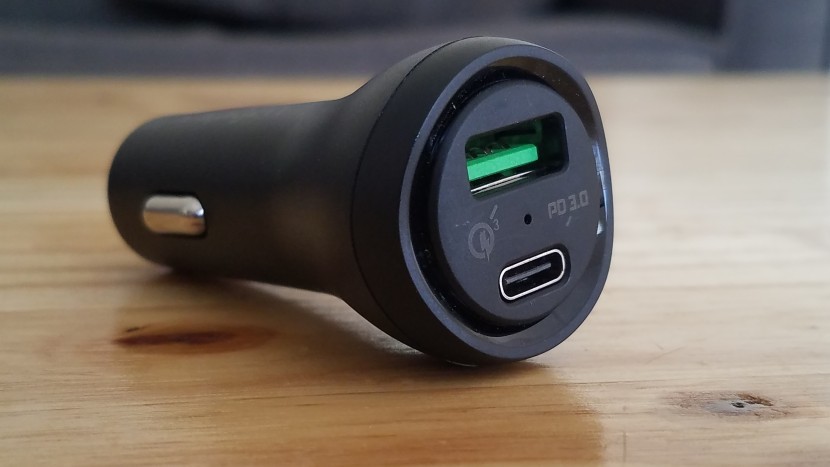 Spigen SteadiBoost Fast Car Charger
Spigen SteadiBoost Fast Car Charger
The Spigen SteadiBoost is a top-tier car charger, capable of rapidly charging devices compatible with QC3 and PD3 technologies.
Credit: Benjamin Hickok
AI AIKENUO Multiport QC 3.0: Best for Multiple QC 3.0 Devices
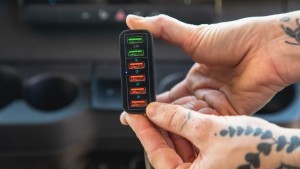 AI AIKENUO Multiport QC 3.0 Car Charger
AI AIKENUO Multiport QC 3.0 Car Charger
68
OVERALL SCORE
- Power Output & Charge Time 9.0
- Ports 8.0
- Features 4.0
- Size 4.0
REASONS TO BUY
- Four QC 3.0 ports for fast charging
- Two additional 2.4A ports
- Maintains consistent power across all ports
REASONS TO AVOID
- Larger, bulkier design
- No PD ports for USB-C devices
SPECIFICATIONS
| Quick Charge Compatible? | Yes |
|---|---|
| Number of Ports | 6 |
| Types of Ports | QC, 2.4A |
| Cord Included? | Yes |
| Total Wattage | 96 |
For users who rely heavily on QC 3.0 compatible devices and need to charge multiple gadgets simultaneously, the AI AIKENUO Multiport QC 3.0 is the best car charger. This robust charger is engineered to deliver substantial power to multiple devices at once, without compromising charging speeds as you plug in more devices.
Featuring four QC 3.0 ports and two standard 2.4 amp USB-A ports, the AI AIKENUO understandably has a larger footprint. However, its design remains sleek and aesthetically pleasing considering its capacity. “This car charger is more than capable of keeping multiple smartphones, tablets, and action cameras powered up for any adventure,” noted our tester. If your device ecosystem leans heavily towards QC or standard USB-compatible devices, this charger is a strong contender. For those needing a high port count along with USB-C compatibility, the Tollefe 5-in-1 provides another excellent option at a similar price point.
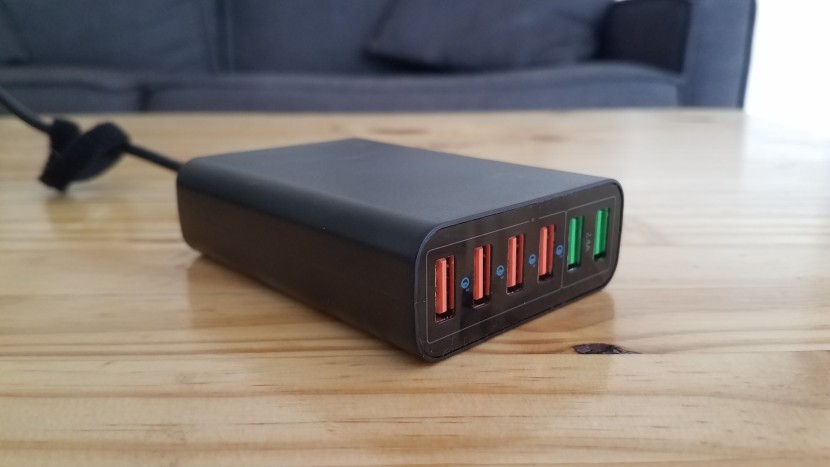 AI AIKENUO Multiport QC 3.0 Design
AI AIKENUO Multiport QC 3.0 Design
The AI AIKENUO Multiport QC 3.0 car charger boasts an attractive design, impressive given its simultaneous support for 4 QC3 ports.
Credit: Benjamin Hickok
iOttie Auto Sense: Best Wireless Car Charger
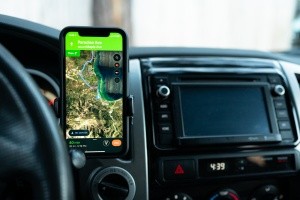 iOttie Auto Sense Wireless Car Charger
iOttie Auto Sense Wireless Car Charger
58
OVERALL SCORE
- Power Output & Charge Time 7.0
- Ports 6.0
- Features 6.0
- Size 2.0
REASONS TO BUY
- Wireless Qi fast charging support
- Includes an extra USB port
- Automatic phone-sensing lock mechanism
REASONS TO AVOID
- Bulky design
- Higher price point
SPECIFICATIONS
| Quick Charge Compatible? | Yes |
|---|---|
| Number of Ports | Wireless with micro-USB port |
| Types of Ports | Wireless Qi, 2.4A |
| Cord Included? | Yes |
| Total Wattage | 10 |
The iOttie Auto Sense Qi Wireless Car Charger is the best wireless car charger for users who prioritize the convenience of wireless charging for their smartphones while driving. Our lead tester praised its ease of use, noting, “The auto-sensing system is incredibly intuitive; simply place your phone on the charger, and it takes care of the rest.” Equipped with Qi wireless charging technology, it offers efficient and fast wireless charging without the need for cables. “A standout feature is the robust suction cup mount,” he added, “which securely holds your phone even on rough roads.” The charger is also designed to accommodate a wide range of phone sizes.
While the iOttie Auto Sense excels in wireless charging convenience, “its design inherently results in a bulkier profile, particularly when compared to more streamlined car phone mounts,” our tester observed. The inclusion of an extra USB port is a welcome feature, though we noted it lacks QC, IQ, or PD fast charging capabilities. Overall, if wireless charging is a primary need, the iOttie Auto Sense is a worthwhile investment. For a more budget-conscious wireless option, the CHGeek Wireless offers reliable wireless charging at a more affordable price.
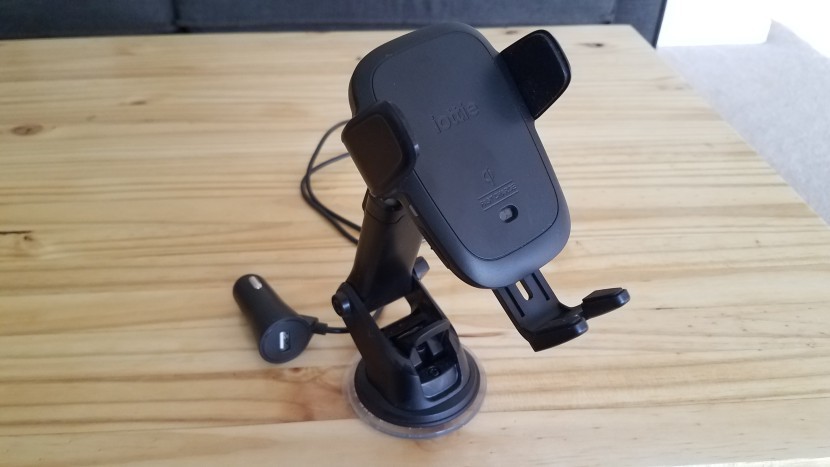 iOttie Auto Sense Intelligent Wireless Charger
iOttie Auto Sense Intelligent Wireless Charger
The iOttie Auto Sense is an intelligent wireless Qi fast charger that automatically detects and secures your phone in place.
Credit: Benjamin Hickok
BESTEK 300W Power Inverter: Best Car Charger for Creators
 BESTEK 300W Power Inverter Car Charger
BESTEK 300W Power Inverter Car Charger
51
OVERALL SCORE
- Power Output & Charge Time 5.0
- Ports 3.0
- Features 9.0
- Size 2.0
REASONS TO BUY
- Integrated A/C outlets for laptops and more
- Two USB-A 2.4A ports
- Relatively affordable for an inverter
REASONS TO AVOID
- Bulky design
- Lacks QC, PD, or IQ fast charging
SPECIFICATIONS
| Quick Charge Compatible? | No |
|---|---|
| Number of Ports | 4 |
| Types of Ports | A/C, 2.4A |
| Cord Included? | Yes |
| Total Wattage | 300 |
The BESTEK 300W Power Inverter is the best car charger solution for content creators and professionals who need to power laptops and other A/C powered devices while on the move. While mobile devices dominate our digital lives, laptops remain essential for demanding tasks like content creation. “While smartphone apps suffice for quick edits,” our lead tester pointed out, “professional-level photo editing or video production necessitates a laptop, which often requires an A/C power outlet.“
As a 300-watt A/C inverter, rather than a DC-to-DC charger, the BESTEK is inherently bulkier. Although it includes two USB-A ports, they are standard 2.4A ports without fast charging protocols like PD or QC. “As a smartphone charger, it’s limited in charging speed,” noted our tester. For users prioritizing rapid smartphone charging, carrying a compact charger like the Spigen SteadiBoost in addition to the BESTEK could be beneficial. “However, for creators on the go, it’s a worthwhile trade-off,” he concluded. Compared to other 300-watt inverters with dual outlets, the BESTEK remains relatively compact. We recommend this as the top choice for individuals needing to power a range of devices, from action cameras and smartphones to laptops for on-location editing and workflow.
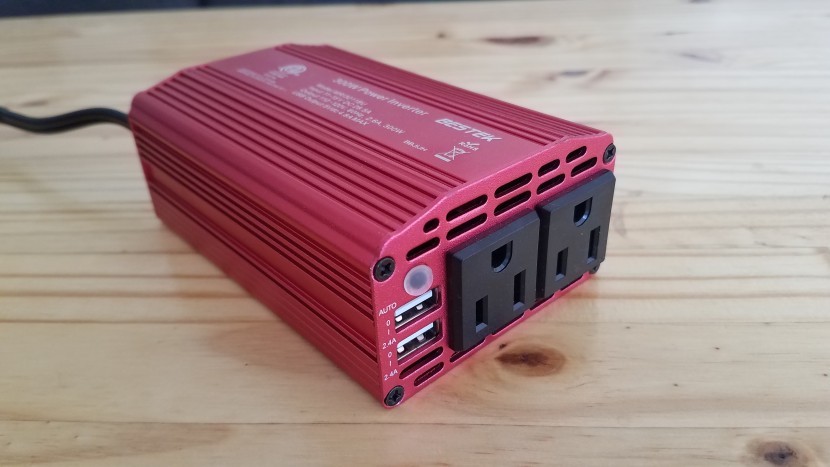 BESTEK 300W Power Inverter for Creators
BESTEK 300W Power Inverter for Creators
The BESTEK power inverter is ideal for creators needing standard USB-A ports along with essential A/C outlets in their vehicle.
Credit: Benjamin Hickok
Product Comparison
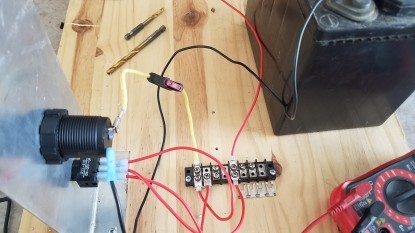 Car Charger Testing Station
Car Charger Testing Station
Our specialized testing station allows for precise current measurements, validating the power output claims of each car charger.
Credit: Benjamin Hickok
How We Test Car Chargers
Our review process began with an extensive survey of the market’s most popular car chargers, followed by a selection of the most promising models for in-depth testing. We prioritized chargers featuring fast charging technologies, broad device compatibility, and multiple ports. These chosen chargers underwent rigorous hands-on testing, encompassing both technical electrical measurements and practical, real-world charging time assessments.
Our testing methodology is structured around four key rating metrics:
- Power Output & Charge Time (35% of overall score)
- Ports (25% weighting)
- Features (25% weighting)
- Size (15% weighting)
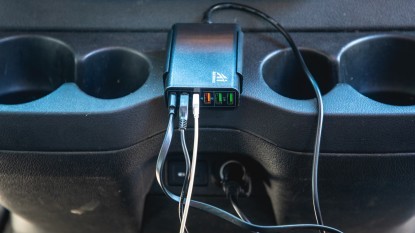 Real-World Car Charger Testing
Real-World Car Charger Testing
Everyday use is crucial for assessing user-friendliness. The AI AIKENUO Multiport offers an abundance of USB-A ports.
Credit: Hayley Thomas
Why Trust GearLab
This review is spearheaded by Ben Hickok, an expert with a strong background in electronics, IoT, software, and hardware. As an avid adventurer engaged in climbing, skiing, hunting, and fishing, Ben spends considerable time on the road, needing reliable power for cameras and other equipment to document his experiences. Working remotely, he frequently relies on car chargers to keep laptops and smartphones operational. He has personally experienced the challenges of managing device power on the go and has refined his approach by seeking out versatile and efficient car chargers to maintain organization and power while traveling.
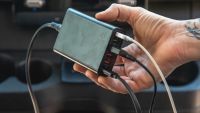 Charging Devices in Car
Charging Devices in Car
From single devices to multiple gadgets, we tested the charging capabilities of each car charger thoroughly.
We put each charger through its paces, charging a variety of devices and pushing their limits to assess real-world performance.
How to Choose the Best Car Charger
Given the array of electronic devices we carry daily, a reliable car charger is essential for maintaining power on the go. This is particularly crucial for road trips or for individuals living out of their vehicles, where a car charger may be the only source of power for phones and other devices. While car chargers may seem similar, significant differences exist, making it important to consider key factors before choosing.
Understanding Charging Technologies
Before selecting a car charger, understanding common charging technologies is vital. PD (Power Delivery), QC (Quick Charge), and IQ (Intelligent Quick Charge) are prevalent technologies used by manufacturers. Each offers unique features and benefits.
-
Power Delivery (PD): This advanced technology uses a sophisticated communication protocol to negotiate voltage and current between the charger and device, enabling faster and more efficient charging. PD can deliver up to 100W and is broadly compatible across devices.
-
Quick Charge (QC): Developed by Qualcomm, QC technology accelerates charging for compatible devices. QC chargers employ a proprietary protocol to increase voltage and current, significantly reducing charging times. Currently up to QC 5.0 (supporting 100W), QC 3.0 is most common in car chargers.
-
PowerIQ (IQ): Anker’s proprietary technology, PowerIQ, also delivers fast and efficient charging. IQ chargers detect connected devices and adjust voltage and current accordingly. IQ is available up to version 3.0 (60W), with IQ 2.0 gaining popularity due to its compatibility with QC 2.0 and QC 3.0, adapting to specific power needs.
Understanding PD, QC, and IQ helps in choosing the best car charger for your specific devices and charging requirements.
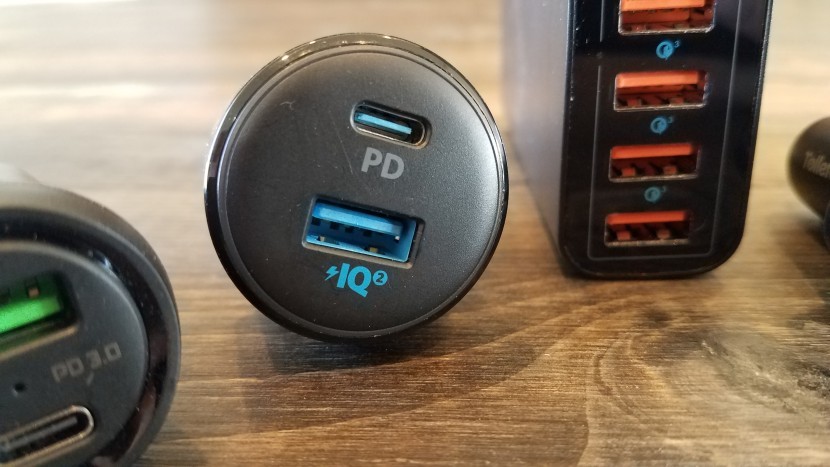 Fast Charging Standards Comparison
Fast Charging Standards Comparison
Fast charging standards like IC2, QC 3.0, and PD 3 are key features in top-performing car chargers.
Credit: Ben Hickok
Charging Speed Needs
Consider your typical charging needs. For quick top-ups during commutes, prioritize Power Output & Charge Time scores in our reviews. While charger output is important, your device’s built-in charging technology is the limiting factor. Identify your device’s fast charging compatibility and match it to the port types listed in our comparison chart to ensure optimal charging efficiency. Most top-rated chargers include both QC and PD, but this isn’t universal.
Number of Devices to Charge
Modern users often carry multiple devices – phones, tablets, smartwatches – all needing charging. Our comparison chart lists port counts under “Specs” and assesses port utility in our “Ports” metric. While port quantity matters, each port should support at least 5V, 2.4A via USB-A. The Best Car Chargers offer multiple ports with fast charging. For charging many devices simultaneously, the AI AIKENUO with six ports (four QC 3.0) is ideal.
A/C Power Cord Needs
For laptops or devices needing standard two or three-prong outlets, a power inverter is necessary. The BESTEK 300W inverter is our top pick, featuring two three-prong outlets and two USB-A ports (though without fast charging). Relatively compact, it’s invaluable for working on the road.
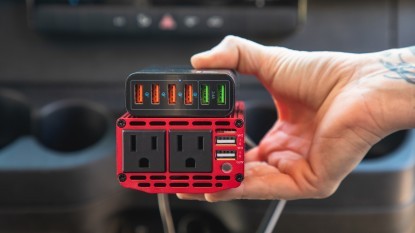 AI AIKENUO and BESTEK Size Comparison
AI AIKENUO and BESTEK Size Comparison
The AI AIKENUO is surprisingly slim for a six-port charger, while the BESTEK A/C inverter is impressively compact for its capabilities.
Credit: Hayley Thomas
Analysis and Test Results: Detailed Breakdown
Our testing analysis is categorized by metric, highlighting top performers and key features to aid in your selection process.
Best Value Car Chargers
For many travelers, powering laptops or complex GPS systems isn’t necessary; a charger capable of quickly charging a smartphone is sufficient. In this context, an A/C inverter is not the most practical or cost-effective solution for daily phone charging. Similarly, a basic 2.4 amp charger is inadequate for power-intensive needs like charging multiple action camera batteries.
Value is assessed by overall performance relative to price. The Tollefe 5-in-1 excels in all-around performance, supporting both QC and PD devices at a very reasonable price. However, the Spigen SteadiBoost offers comparable performance, including PD and QC 3.0 support, at an even lower cost, making it the best value choice.
For users solely needing a QC 3.0 charger for compatible devices like Samsung phones, the Hussell 3.0 is a highly economical option, providing reliable performance at a budget price.
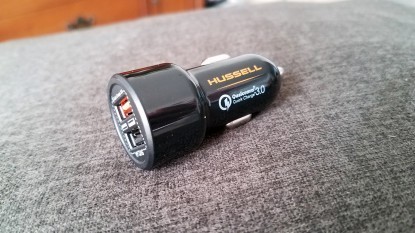 Hussell 3.0 QC 3.0 Car Charger
Hussell 3.0 QC 3.0 Car Charger
The budget-friendly Hussell 3.0 car charger with QC 3.0 capability.
Credit: Benjamin Hickok
Power Output & Charge Time Performance
Charging time is primarily determined by a charger’s power output, though device-side charging circuitry ultimately limits speed. This metric, weighted at 35%, is crucial in our scoring.
The SteadiBoost is exceptional for reliably supporting both PD USB-C and QC 3.0 USB-A ports. The AI AIKENUO also performs strongly, though lacking PD ports. It compensates with four QC 3.0 and two 2.4A ports, maintaining consistent power across all ports even during simultaneous use, ideal for multiple QC 3.0 devices.
We also noted the UGREEN USB C for its general QC 3.0 and PD support. However, longer cables hindered its QC 3.0 performance, unlike other top models which maintained performance with longer cables.
The Tollefe 5-in-1 performs well with multiple devices but shows performance degradation beyond three devices in certain configurations. Ideally, all ports should deliver maximum rated power without throttling when multiple devices are connected.
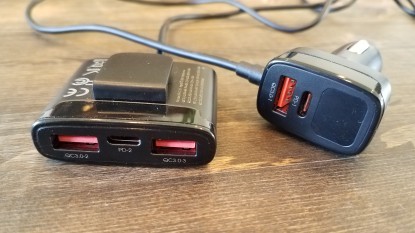 Tollefe 5-in-1 Smart Charging Ports
Tollefe 5-in-1 Smart Charging Ports
The Tollefe 5-in-1 car charger’s five smart charging ports make it a top contender for overall performance.
Credit: Ben Hickok
The Nekteck USB Type C and Hussell 3.0 are solid performers, each supporting at least one PD or QC protocol. The BESTEK Power Inverter stands out as the only model with 110-120V A/C outlets (up to 300 watts across two), though its USB ports are standard 5V 2.4A.
Wireless chargers, like the iOttie Auto Sense (using its included charger) and CHGeek Wireless (paired with a QC 3.0 charger), achieved 10W Qi fast wireless charging, dependent on device compatibility.
The Scosche ReVolt Dual and AINOPE Mini 4.8A ranked lower in power output, lacking smart charging and limited to 2.4A USB-A outputs.
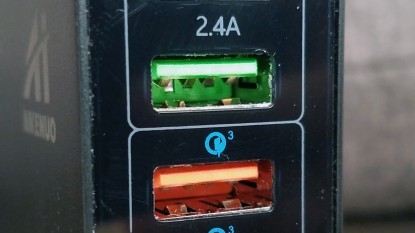 USB-A QC 3.0 and 2.4A Ports
USB-A QC 3.0 and 2.4A Ports
A combination of USB-A QC 3.0 port and standard USB-A 2.4A ports for versatile charging options.
Credit: Benjamin Hickok
Port Quantity and Quality
Our “Ports” metric, contributing 25% to the overall score, evaluates both the number and quality of ports, specifically focusing on “rated” ports (QC 3.0, PD 3, IQ). Minimum expectation was at least one port supporting these protocols, with any additional ports being 5V 2.4A USB-A or better. Top chargers feature multiple ports with QC 3.0 and PD 3 support.
The AI AIKENUO leads in port count with six total ports, primarily for QC 3.0 devices, including four QC 3.0 ports and two 5V 2.4A USB-A ports, but lacks PD ports.
The Tollefe 5-in-1 follows with five intelligent ports: three QC 3.0 and two PD 3. Its unique design places ports at both the 12V plug and the end of a 6-foot extension cable, benefiting rear-seat passengers.
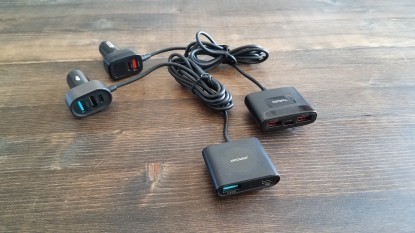 5-Port Car Charger Designs
5-Port Car Charger Designs
Two car chargers showcasing similar 5-port designs for versatile charging solutions.
Credit: Benjamin Hickok
However, the Tollefe 5-in-1 cannot sustain full charging rates on all five ports simultaneously, effectively limited to optimal charging for around three devices.
The Spigen SteadiBoost again ranks highly for its two rated USB ports. Wireless chargers naturally have fewer ports, aligning with their design focus.
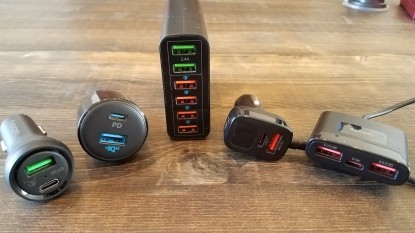 Port Variety and Charger Sizes
Port Variety and Charger Sizes
A comparison of port variety and physical sizes across some of the top car chargers tested.
Credit: Benjamin Hickok
Features and Build Quality
Value-added features contribute 25% to a charger’s score. We assessed charging indicators, power lights, port illumination, voltmeters, LED displays, build quality, finish, A/C ports, and fuse types. For models with PD, QC, or IQ, we considered their intelligent circuit protection.
The AINOPE Mini, despite limited performance, stands out for its elegant all-metal housing and flush fit in 12V outlets. The iOttie Auto Sense features an easy-to-use phone detection and locking mechanism, plus an additional USB-A port. The Hussell 3.0 impresses with brightly illuminated ports.
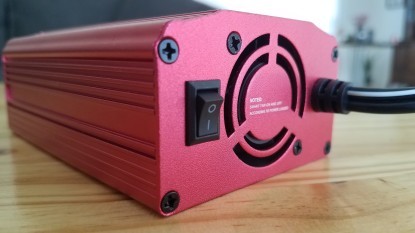 BESTEK Power Inverter Features
BESTEK Power Inverter Features
The BESTEK power inverter features a rocker power switch and an automatic cooling fan for enhanced functionality.
Credit: Benjamin Hickok
The Tollefe 5-in-1 includes a practical voltmeter, displaying vehicle battery voltage to prevent over-discharge, a particularly useful feature for older vehicles.
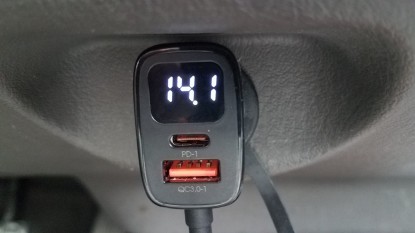 Tollefe 5-in-1 Voltmeter Feature
Tollefe 5-in-1 Voltmeter Feature
The Tollefe 5-in-1 car charger’s built-in voltmeter is a clear and useful feature for monitoring battery voltage.
Credit: Benjamin Hickok
Size and Portability
Size contributes 15% to the final score, rewarding compact designs, balanced against port quantity.
The AINOPE Mini and Scosche ReVolt Dual are the smallest chargers tested, though lacking QC, IQ, or PD, thus slower for modern devices.
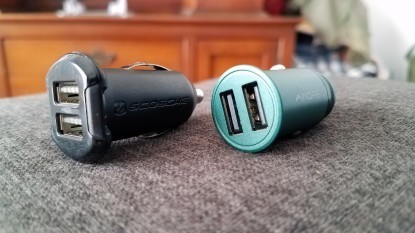 Smallest Car Chargers Comparison
Smallest Car Chargers Comparison
The Scosche and Ainope, the two smallest car chargers evaluated in our tests.
Credit: Benjamin Hickok
The Hussell 3.0 and UGREEN USB C, slightly larger, offer better performance and at least one smart charging protocol (QC3 for Hussell, PD for UGREEN). The UGREEN’s QC 3.0 performance was cable-dependent.
More advanced chargers like the Spigen SteadiBoost, while slightly bulkier, offer intelligent charging technologies and multiple ports. Larger models like the AI AIKENUO and Tollefe 5-in-1 prioritize port count and versatility. Wireless chargers (CHGeek and iOttie Auto Sense) are bulkier due to their design but offer wireless convenience.
The BESTEK Power Inverter, the largest, is justified by its 300W inverter capability, housing A/C outlets, USB ports, and a cooling fan in a solid aluminum case.
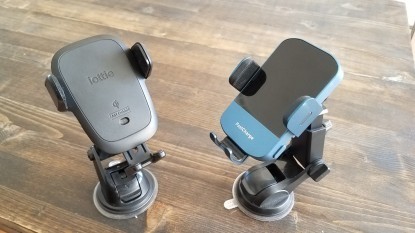 Wireless Car Chargers Comparison
Wireless Car Chargers Comparison
Two wireless car chargers tested, both supporting Qi charging when paired with a QC3 charger.
Credit: Benjamin Hickok
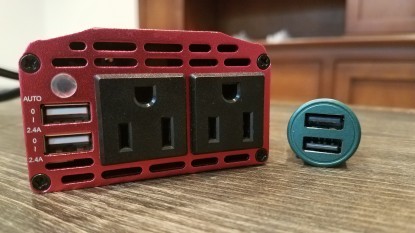 Smallest vs. Largest Car Charger Size Comparison
Smallest vs. Largest Car Charger Size Comparison
A stark contrast in size between the smallest and largest car charger models we tested.
Credit: Benjamin Hickok
Conclusion: Choosing Your Best Car Charger
We hope this detailed testing and evaluation of leading car chargers provides the information needed to understand charging technologies and device compatibility. By considering your devices, vehicle, and lifestyle, you can choose the best car charger to meet your specific needs. For more vehicle accessory recommendations, explore our guides on jump starters, tire gauges, and car phone mounts.